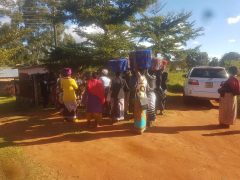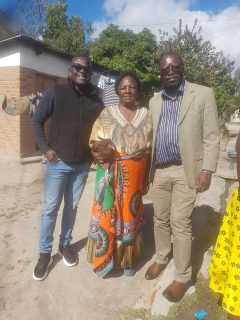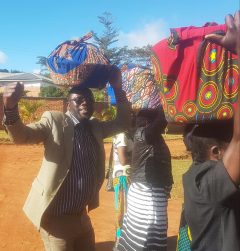Day #20 – June 20, 2019
“That complex whole.” came alive in Chumaliru when two consenting adults decided to get married and form a family.”*
By A. Kusi-Appiah, 2019 Queen Elizabeth Scholar, Carleton University.
1. Introduction:
Marriage is a very important institution (the others are *socialization*, economy, law/order and religion/spirituality) in any society (Assimeng, 1988), for it is the building block on which any society grows in numbers and flourishes, and just like all other cultural institutions, elaborate rites and ceremonies are performed to mark the various milestones of a marriage. For the African, there has to be a symbolic ceremony with pomp and pageantry for every stage in one’s life – marriage included (Assimeng, 1988). It is one of the many ways in which African culture comes alive around the globe. Such ceremonies require the extensive use of water especially in cooking all the food that is consumed at each stage of the process and the cleaning that has to be done before, during and after cooking and consumption of the prepared food.
On Sunday June 16 2019, I witnessed a wonderful event commemorating a milestone in the joining together of two families as a prelude to the impending marriage of two consenting adults in the city of Mzuzu (Northern Region of Malawi). The event occurred at the family residence of the groom-to-be in Chumaliru. Chumaliru is scenic suburb of Mzuzui that exhibits  periurban characteristics just like nearby Lower Zolozolo (where the family of the bride-to-be have their ancestral home). This is a ceremony that clearly reminded me that African culture is alive and very significant and therefore must be preserved for future generations. I have witnessed many traditional marriages over the years, this one only cemented my conviction that Africa’s traditions are indeed worth preserving.
periurban characteristics just like nearby Lower Zolozolo (where the family of the bride-to-be have their ancestral home). This is a ceremony that clearly reminded me that African culture is alive and very significant and therefore must be preserved for future generations. I have witnessed many traditional marriages over the years, this one only cemented my conviction that Africa’s traditions are indeed worth preserving.
2. Culture, culture, who art thou?:
The story is told of two consenting adults (a male and a female) who met in faraway Blantyre (Malawi) and decided to tie the proverbial knot in marriage. But that couldn’t just happen until all the *customary marriage rights* had been performed and the *church’s blessings* had been bestowed upon the couple (both families identify as Catholics by religion). The customary rites represents a significant part of African culture, it becomes the ‘blueprint’ for behaviour in every society. According to EB Tylor (1871) culture is:
*”…that complex whole which includes knowledge, beliefs, artifacts, mores, laws, customs and all other capabilities performed by (wo)man as a member of society.”*
(EB Tylor, 1871).
EB Tylor’s classic definition is instructive on many levels: First, his definition gives equal importance to all cultures and identifies common traits that is present in each and every culture. Second, he makes it clear that all cultural traits are relevant and serve an important purpose in the lives of the people who participate in it. The importance of one’s culture manifests itself in the five (5) cultural institutions stated in the introduction of this blog, and it comes alive through one’s mother tongue (language). In this case, the rich language of Tumbuka (common language spoken and used in everyday business in Northern Malawi) takes centre stage.
Needless to say, language is a very important part of any culture, and any society that lacks a mother tongue is seriously missing an important trait. And indeed, one’s mother tongue is the limit through which all traditions are articulated and transmitted from generation to generation (Achebe, 1981). Without one’s mother tongue (not just any acquired language) humans remain completely lost in space, for as Wittgenstein (1922: 5,6-7) succinctly puts it:
*”….what can be said at all can be said clearly, and what we cannot talk about we must pass over in silence……..what cannot be imagined cannot even be talked about……the limits of my language mean the limits of my world. (5.6)…..whereof one cannot speak, thereof one must be silent.”*(Wittgenstein in Tractatus Logico-Philosophicus, 1922).
3. Reclaim your mother tongue and progress:
A big chunk of any society’s development depends on knowledge and use of their own language, but if that language is taken away by dubious legislation and policy (as it was in the case of *Indigenous peoples* all over the world), or if that language is deliberately made redundant through *alien socialization processes* imposed by colonial and postcolonial agents in the name of *”progress”* (as it is in the case of the numerous artificial boundaries of many modern nations/states/countries etc.), there is bound to be stagnation and/or constant false starts in many projects meant to drive the development agenda.
It is against this backdrop that the Trudeau government of Canada needs to be applauded. In the aftermath of the tabling of the 94 recommendations of the Truth & Reconciliation Commission of Canada (TRC) in 2015, the federal Liberal government of Prime Minister Justin Trudeau has gotten it right by tabling legislation to revive Indigenous languages from coast to coast to coast in present day Canada. This will enable Indigenous people in the *”Turtle Island”* to reclaim a very important part of their heritage and consequently allow them to achieve much needed reconciliation.
The TRC was officially established on June 2, 2008 with the purpose of documenting the history and lasting impacts of the Canadian Indian residential school system on Indigenous students and their families. It provided residential school survivors an opportunity to share their experiences during public and private meetings held across the country. The loss of Indigenous languages through the deliberate policy of “….taking the Indian out of the Indian” by denying Indigenous people the use and study of their languages in school, became the major complaint centre of all Indigenous people who testified at the concern to many Indigenous people who testified at the meetings of the commission.
Other significant African philosophers have also echoed the important place of ‘mother tongue’ in development. A leading female philosopher of the Akyem Kotoku traditional area of present day Ghana, Obaapanin Akua Akrasi (born in 1908 and died in 2008) was of the view that not using one’s mother tongue is a mistake which can come back to hurt one’s progress. According to Akrasi, even dreams only occur in one’s mother tongue before it is translated into any other language that one has acquired. Ayi Kwei Armah (born 28 October 1939) is a Ghanaian writer best known for his call for the preservation of mother tongue all over Africa. Chinua Achebe is also known for advocating for the use of mother tongue and preservation of African languages on the continent. Other philosophers and African writers such as Ama Ata Aidoo and Ngugi Wa Thiongo have all written extensively about the importance of mother tongue and the role it plays in transmitting and preserving African cultures.

4. Consenting adults need permission to ‘shack up’:
According to Malawi culture, as in all other cultures of Africa, one needs permission to cohabit with another consenting adult. And this I must add, is *non-negotiable*! Traditionally, and as narrated by grandma Akrasi under the moon light:
*”when two individuals of the opposite sex meet and they are interested in each other (provided they are not related by blood), the next step is for the male suitor to go and see the parents of the female suitor and ‘ask’ for her hand in marriage. In Akan tradition, the male suitor’s family negotiates the ‘dowry’ with the family of the female he is seeking to marry. It must be made clear that this material (s) (usually called a dowry) *does not* signify a *purchase* from the market. *Buying* as in the *capitalist* sense of *owning* a property, does not apply here. In this transaction (for lack of a better word in this foreign language I am using), no commodity is being bought or sold, rather, the item(s) or material(s) being sought/demanded/parted with is only *symbolic* (remember the body of Christ?). It (the dowry) is supposed to show appreciation to the family for having taken care of the female suitor, and it also serve as evidence of the occasion and intentions.”
(Conversations with Grandma Akrasi, 1988).
In a discussion with my Mzuzu friend whose sister was getting married, I gathered that a similar event (i.e., dowry negotiation and acceptance) had already been witnessed in Lower Zolozolo where the female suitor’s family reside. Today’s (June 16, 2019) event is however a little different from what happens in Akan tradition as narrated by Grandma Akrasi above. In Tumbuka culture (Mzuzu, Malawi), after the ‘dowry’ has been negotiated and accepted, a date is set aside for the family of the female suitor to visit the family of the male suitor in their family home. That date was Sunday June 16 2019.
Before setting off from Lower Zolozolo (one of my six study areas) to the family house of the  groom-to-be, the family of the bride-to-be performed a short ceremony at the family home beginning with a short prayer and the consumption of an alcohol-free millet drink prepared by female members of the family. I am told that the millet drink *symbolises* the work of mainly the womenfolk in the family: from tilling the soil, to planting the millet, tending and watering it and harvesting for the millet to be prepared into a beverage with *water* from the wells of Lower Zolozolo. In each step of the way, the importance of *water* is *highlighted and emphasised*.
groom-to-be, the family of the bride-to-be performed a short ceremony at the family home beginning with a short prayer and the consumption of an alcohol-free millet drink prepared by female members of the family. I am told that the millet drink *symbolises* the work of mainly the womenfolk in the family: from tilling the soil, to planting the millet, tending and watering it and harvesting for the millet to be prepared into a beverage with *water* from the wells of Lower Zolozolo. In each step of the way, the importance of *water* is *highlighted and emphasised*.
As part of the marriage process, the family of the bride-to-be is obligated to bring presents to the family of the groom-to-be on this occasion. I counted 10 live fowls and 14 buckets of corn meal and other food items loaded onto one of the male member’s pick-up truck to be transported to Chumaliru where the family of the groom-to-be resides (a distance of less that 5km from Lower Zolozolo). In total, 20 family members of the bride-to-be made the short trip to Chumaliru.